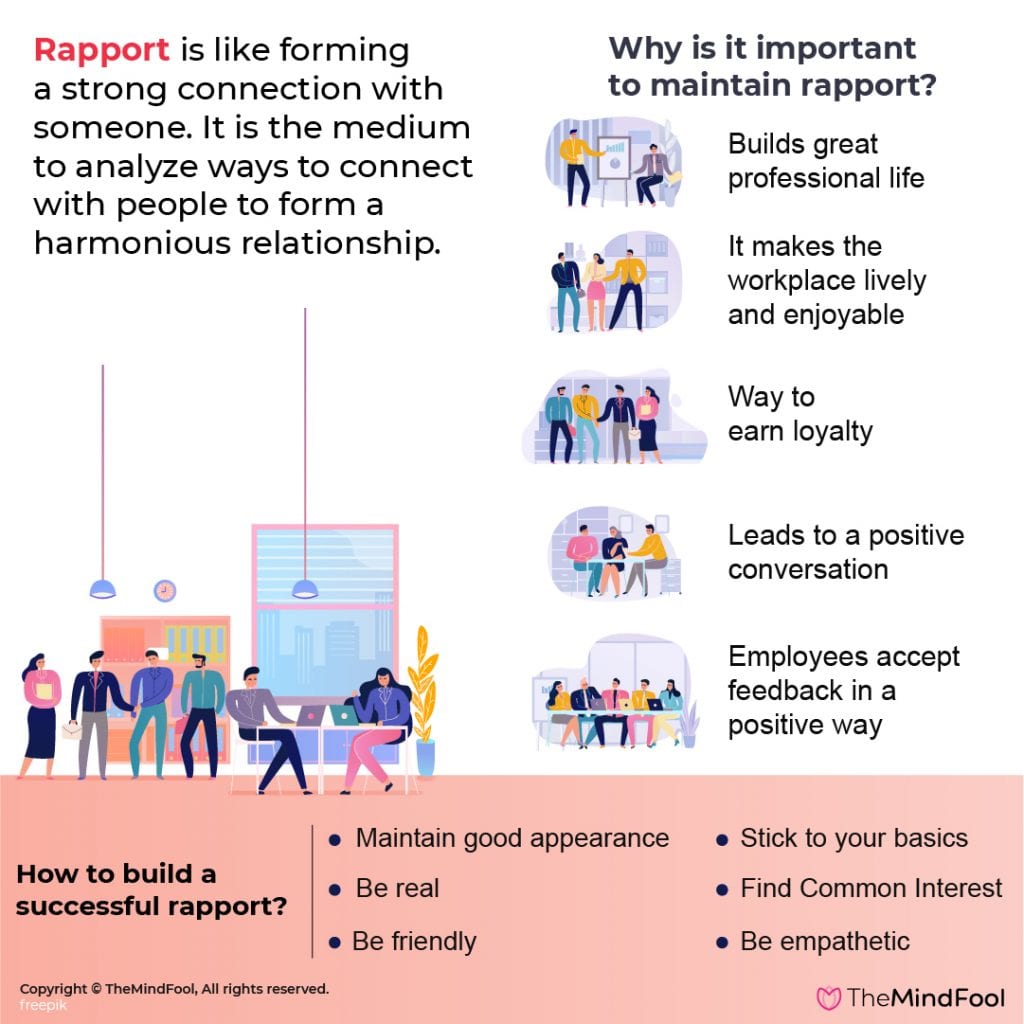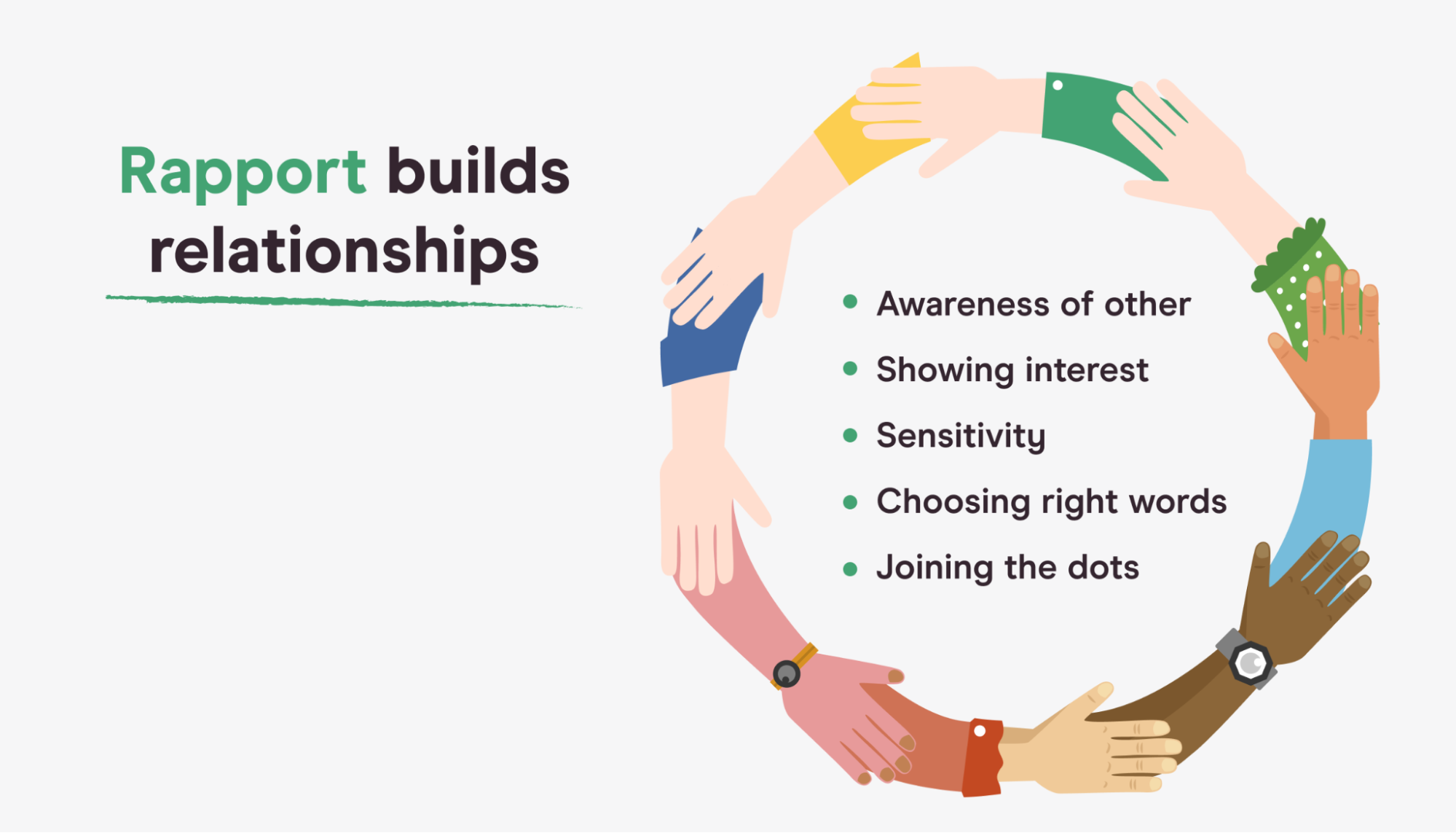What Is Rapport Building?
Rapport building is the process of establishing a connection and mutual understanding with someone. It involves building trust, rapport, and a positive relationship.
Building rapport with others is a crucial skill in both personal and professional settings. It helps to create a comfortable and open environment, which can lead to better communication, collaboration, and overall success in various interactions. Whether it is establishing rapport with clients, colleagues, or friends, the ability to build rapport can greatly enhance relationships and foster meaningful connections.
The process of building rapport includes actively listening and showing genuine interest in the other person’s thoughts, feelings, and experiences. It also involves finding common ground and shared interests, using body language and verbal cues to convey empathy and understanding, and maintaining a positive and respectful attitude throughout the interaction. By practicing effective rapport-building techniques, individuals can enhance their communication skills and create more meaningful connections with others.

Credit: www.yesware.com
Importance Of Rapport Building
Rapport building is a crucial aspect of effective communication and forming strong connections with others. It is the foundation of successful relationships, whether they are personal or professional. The ability to establish rapport creates an environment of trust, understanding, and mutual respect.
Enhances Communication
When we build rapport with someone, we establish a sense of familiarity and mutual understanding. This creates a comfortable space where communication flows more easily. Individuals who have a strong rapport with each other are more likely to listen and be receptive to one another, leading to a more productive exchange of ideas and information.
Rapport building involves active listening and empathy, allowing us to gain insight into the thoughts, feelings, and perspectives of others. By understanding their needs and interests, we can tailor our communication style to effectively convey our message, ensuring it resonates with the other person. This enhances overall communication and creates a harmonious interaction.
Builds Trust And Connection
Trust is the cornerstone of any successful relationship, whether it’s between friends, colleagues, or clients. Building rapport helps establish trust by demonstrating respect, authenticity, and reliability. When we take the time to connect with others on a personal level, they feel valued and understood.
A strong rapport builds a sense of connection and fosters a safe environment, encouraging open and honest communication. Through consistent interaction and positive experiences, trust is nurtured and deepened. This trust becomes the foundation for long-lasting relationships, where individuals feel comfortable sharing their thoughts, concerns, and ideas.
In addition to trust, rapport building also creates a sense of connection. It allows individuals to see beyond titles or roles, promoting a genuine connection that goes beyond superficial interactions. This connection leads to stronger relationships, increased collaboration, and a more positive work or personal environment.
In conclusion, rapport building plays a vital role in fostering effective communication and establishing trust and connection with others. By actively listening, practicing empathy, and demonstrating authenticity, we can create harmonious relationships built on mutual understanding and respect.

Credit: www.salesreadinessgroup.com
Key Strategies For Rapport Building
Rapport building is the foundation of establishing strong relationships with others, whether it’s in personal or professional interactions. It involves creating a sense of connection, trust, and understanding between individuals. By employing key strategies, you can enhance your rapport building skills and cultivate meaningful relationships that can lead to increased collaboration, cooperation, and success.
Active Listening
Active listening is a vital strategy for building rapport, as it shows genuine interest and attentiveness in the person you are communicating with. It involves fully focusing on the speaker, giving them your undivided attention, and actively responding to their message.
Here are some key techniques for active listening:
- Maintain eye contact to demonstrate your engagement and understanding.
- Nod or provide non-verbal cues such as smiling or leaning forward to indicate that you are listening attentively.
- Paraphrase or summarize their words to show you comprehend and are actively processing their message.
- Avoid interrupting and allow the speaker to express themselves fully before responding.
Empathy And Understanding
Empathy and understanding are fundamental aspects of rapport building. By putting yourself in the other person’s shoes and seeking to understand their perspectives, emotions, and experiences, you can create a sense of trust and connection. This helps foster an environment where individuals feel valued and heard.
To enhance empathy and understanding:
- Listen actively and without judgment, encouraging the speaker to express their thoughts and feelings openly.
- Validate their emotions by acknowledging their experiences and showing empathy towards their challenges or concerns.
- Avoid making assumptions or jumping to conclusions, and instead, ask open-ended questions to gain deeper insights into their perspectives.
- Respect their opinions and beliefs, even if they differ from your own, fostering an inclusive and respectful environment.
Non-verbal Communication
Non-verbal communication plays a significant role in rapport building, often conveying more than words alone. It involves using body language, facial expressions, and gestures effectively to enhance understanding and convey openness.
Here are some key elements of non-verbal communication:
| Element | Description |
|---|---|
| Posture | Sit or stand in an open and relaxed position to communicate approachability and receptiveness. |
| Facial Expressions | Use facial expressions such as smiling or nodding to show interest, agreement, or understanding. |
| Eye Contact | Maintain appropriate eye contact to demonstrate attentiveness and respect. |
| Gestures | Use hand gestures to emphasize key points or show engagement, but avoid excessive or distracting gestures. |
In conclusion, by employing key strategies such as active listening, empathy and understanding, and effective non-verbal communication, you can enhance your rapport building skills. These techniques create a strong sense of connection, trust, and understanding, leading to enriched relationships and increased collaboration in various aspects of your life. Building rapport is a valuable skill that can positively impact your personal and professional interactions.
Benefits Of Rapport Building
Rapport building is the process of establishing a connection and trust with others, leading to better communication and collaboration. It enhances teamwork, improves relationships, and fosters mutual understanding.
Positive Relationships
Rapport building is the foundation of positive relationships, both personally and professionally. Building rapport with others helps to establish trust, create a sense of connection, and foster open communication. When individuals feel a genuine connection with one another, they are more likely to collaborate, share ideas, and work towards common goals.Increased Influence And Persuasion
One of the key benefits of rapport building is increased influence and persuasion. When you have a strong rapport with someone, they are more likely to consider your perspective, listen to your ideas, and be influenced by your opinions. This can be especially valuable in professional settings, where the ability to influence others can lead to career success and advancement. Building rapport allows you to establish a level of trust and understanding that can positively impact how others perceive you and your ideas. When individuals feel a sense of connection with you, they are more open to being persuaded and influenced by your suggestions. This increased influence can lead to greater collaboration, improved teamwork, and ultimately, more successful outcomes. In conclusion, the benefits of rapport building are undeniable. Positive relationships and increased influence are just two of the many advantages that come from cultivating rapport with others. By focusing on building connections, fostering open communication, and establishing trust, you can reap the rewards of rapport building in both your personal and professional life.Obstacles To Rapport Building
Building rapport is essential for establishing strong relationships and connections with others. However, there are certain obstacles that can hinder the process of rapport building. These obstacles include a lack of empathy and communication barriers. Let’s take a closer look at each of these challenges:
Lack Of Empathy
Empathy is the ability to understand and share the feelings of another person. It is a crucial element in building rapport, as it allows us to connect on a deeper level with others. When we lack empathy, it becomes difficult to truly understand and relate to someone’s experiences and emotions. This can make it challenging to establish trust and create meaningful connections. To overcome this obstacle, it’s important to practice active listening, put yourself in the other person’s shoes, and show genuine concern for their well-being.
Communication Barriers
Effective communication is vital for building rapport, but various barriers can impede the process. These barriers can include language differences, cultural misunderstandings, and even physical obstacles like noise or distractions. When faced with communication barriers, it’s essential to actively work towards overcoming them. This can involve using simple and clear language, paying attention to non-verbal cues, and seeking clarification when needed. By breaking down these communication barriers, we can foster open and honest dialogue, facilitating the rapport-building process.
Tips For Successful Rapport Building
Building rapport is an essential skill in establishing strong and meaningful connections with others. Whether it’s in personal relationships or professional settings, developing rapport creates a foundation of trust and understanding. Here are some effective tips to help you build rapport successfully:
Finding Common Ground
Finding common ground is one of the key ingredients in rapport building. When you can identify shared interests, experiences, or values, it establishes a sense of connection and familiarity. Here are a few strategies to help you find common ground:
- Listen attentively: Pay close attention to what the other person is saying and show genuine interest in their experiences and opinions.
- Ask open-ended questions: Asking open-ended questions allows for more in-depth conversations and enables you to discover shared interests or experiences.
- Share personal stories: Sharing relevant personal experiences can create a sense of camaraderie, helping to establish common ground.
Respecting Individual Differences
While finding common ground is important, respecting individual differences is equally vital in building rapport. Every person is unique, and acknowledging and valuing these differences can enhance your relationships. Consider the following approaches to respect individual differences:
- Show empathy: Put yourself in the other person’s shoes and strive to understand their perspective and feelings.
- Be non-judgmental: Avoid making assumptions or passing judgment based on differences; instead, embrace diversity with an open mind.
- Practice active listening: Give the person your undivided attention, focusing on their words, tone, and body language. This demonstrates respect and understanding.
- Adapt your communication style: Tailor your communication approach to suit the individual’s preferences, such as adjusting your tone, pace, or language.
By actively incorporating these strategies into your interactions, you can foster positive connections and build strong rapport with others. Remember, building rapport takes time and effort, but the results are worth it – lasting, meaningful relationships built on trust, understanding, and respect.

Credit: www.attendancebot.com
Frequently Asked Questions For What Is Rapport Building?
What Is Rapport Building?
Rapport building is the process of establishing a strong connection and mutual understanding with someone, often done through effective communication techniques.
Why Is Rapport Building Important?
Rapport building is important because it creates trust, enhances communication, and fosters positive relationships, ultimately leading to successful interactions and collaborations.
How Can I Improve My Rapport Building Skills?
To improve your rapport building skills, focus on active listening, showing genuine interest, mirroring body language, and finding common ground with the other person. Practice empathy and be mindful of your communication style.
Conclusion
Building rapport is essential in any relationship. Whether it is in personal or professional settings, the ability to establish a connection with others is crucial. Rapport building involves actively listening, showing empathy, and building trust. By understanding the importance of rapport building, you can enhance your communication skills, create stronger relationships, and achieve greater success in your interactions.
Remember, effective rapport building is a lifelong skill that can greatly impact your personal and professional life. Start implementing these techniques today and watch as your connections flourish.



